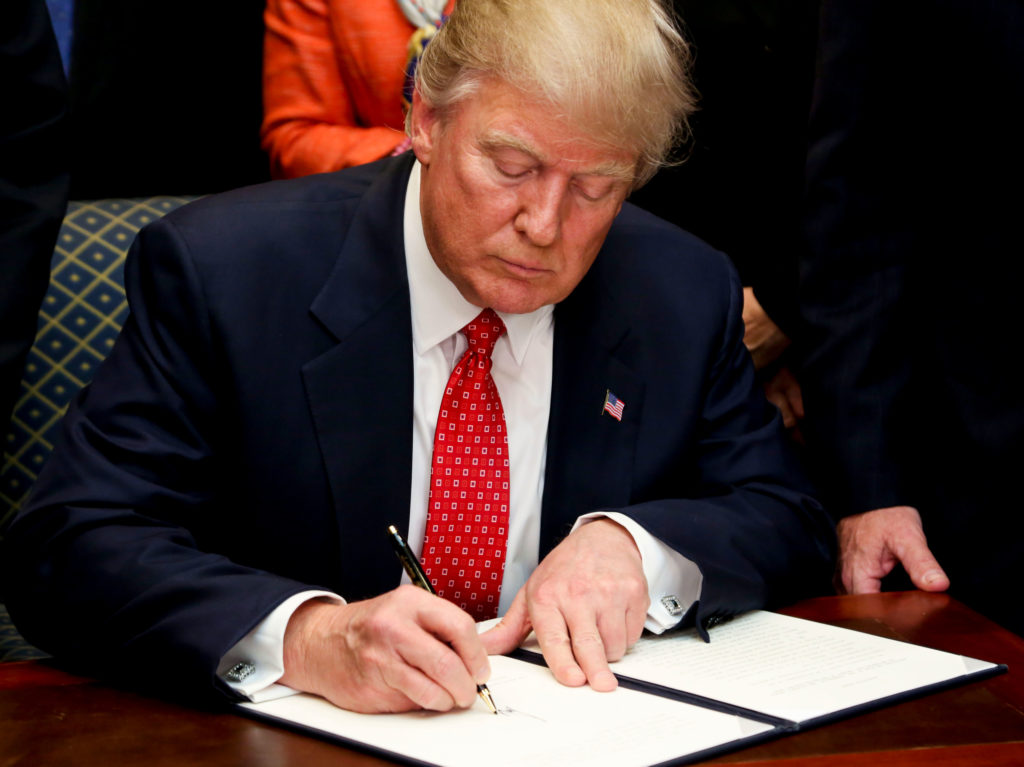President Donald Trump, even before hitting his 100th day as president, has begun to make good on his campaign promise to curtail overregulation.
That should continue for regulations of the harshest variety: arcane rules whose violation is a federal crime.
The president’s efforts began in January, when he issued his first executive order designed to control regulatory costs and stem the seemingly endless flow of regulations being pumped out by federal bureaucrats.
A month later, he signed another executive order to create a regulatory reform task force within each agency.
The president has since taken further targeted actions to lessen the regulatory yoke borne by Americans.
In continuing this effort, the administration should be intentional in eliminating some of the most menacing rules that carry criminal penalties for regulatory infractions where civil fines or administrative remedies would be sufficient to redress harm and deter noncompliance.
Trump has already targeted two such regulations: the Waters of the United States rule (or WOTUS), and the overtime rule.
Waters of the United States
The Clean Water Act, originally passed in 1972, has long determined what constitute “navigable waters”—that is, the waters subject to federal regulation.
Under President Barack Obama, the Waters of the United States rule expanded the reach of this act by redefining the scope of “navigable waters.”
According to the WOTUS rule, “navigable waters” protected under federal law (33 U.S.C. § 1362) are not limited to major lakes and rivers, but include streams, ponds, and even shallow or dry ditches.
The rule represents a fundamental violation of private property rights, and is particularly menacing toward small businesses.

President Donald Trump signed an executive order on Feb. 28 directing the Environmental Protection Agency and Army Corps of Engineers to review the Waters of the United States rule, and if warranted, rescind or revise it. (Photo: Sipa USA/Newscom)
According to the National Federation of Independent Business, the regulation “require[s] small businesses and other property owners to spend tens of thousands of dollars to obtain federal permits before doing things as simple as landscaping or dredging soil if the land (or land near it) collects water for any significant period of time throughout the year.”
For example, after a rancher built a stock pond from a stream on his private land, the Environmental Protection Agency claimed jurisdiction over his backyard oasis and threatened his family with fines totaling $37,500 per day.
The agency also extracted a guilty plea from a building engineer who diverted sewage system overflow at a military retirement home into a storm drain because, unbeknownst to him, it led into a protected creek that eventually flowed into a river.
These penalties are not chump change. Individuals who negligently violate the Clean Water Act are subject to a maximum fine of $25,000 per day that the violation occurs and one year in prison.
The rule’s validity is currently bound up in litigation, enjoining its enforcement. Not content to wait for the courts to opine upon the constitutionality of the rule, Trump has directed the Environmental Protection Agency to review and, if warranted, revise it.
>>> What You Need to Know About Trump’s Executive Order on the Water Rule
Overtime Rule
Second, the Obama Department of Labor’s overtime rule endeavored to double the maximum salary that an employee must receive to be exempt from overtime pay rules to $47,476 a year.
Ensuring that salaried employees receive additional compensation for working over 40 hours in a week may sound beneficial to workers on its face.
But, as Heritage Foundation scholars have written elsewhere, the rule would turn over 4 million salaried employees into hourly workers, restrict employee flexibility by forcing more workers to punch a timecard, and “cost businesses $6.9 billion in [estimated] compliance costs.”
If there were nothing more to it, this alone could be particularly devastating for small businesses.
Under the Fair Labor Standards Act (29 U.SC. § 216), business owners who fail to comply with overtime regulations, willfully or otherwise, face a fine of up to $10,000 and up to six month’s imprisonment.
The market should set wage rates, but civil remedies exist to make an employee whole if an employer undercompensates him in relation to regulatory or contractual requirements.
This rule too is tied up in litigation after a federal judge in Texas halted its implementation last November.
More Action Needed
On Inauguration Day, Trump issued a memorandum freezing the implementation of a host of rules, including the Obama overtime standard before it became effective. The rule is now ripe for review, and ultimately withdrawal, by the Department of Labor.
These actions are a hopeful start to the Trump administration’s regulatory reform agenda, but there is much more work to be done. Many additional rules unnecessarily use the threat of criminal penalties to compel compliance with regulatory objectives, and are in need of modification or repeal.
Take for instance the Food and Drug Administration’s food labeling provisions (79 F.R. 71155). The FDA is responsible for enforcing a myriad of food labeling regulations promulgated under the Federal Food, Drug, and Cosmetic Act.
New regulations written by the FDA under an Obamacare provision require restaurants with over 20 locations to display calorie counts for all food items sold.
Under the law, anyone who mislabels a commercial food product in violation of FDA regulatory standards could be offering a “misbranded” product, which is a federal crime (21 U.S.C. § 333) punishable by imprisonment up to one year and a fine of up to $1,000.
>>> FDA’s Final Menu Labeling Rule: Going Way Beyond What’s Required Under Obamacare
As executive vice president of Domino’s Pizza, Tim McIntyre, explained: “If people are heavy handed with cheese or pepperoni, and a pizza doesn’t meet standards and is outside of the range of the nutritional labeling, then that could be a store manager liable for a criminal penalty.”
The government has a role in protecting public health and safety, but reliance on criminal law to do so is often misguided. Just stop into your nearest mom and pop or Domino’s pizzeria and ask how regulatory compliance burdens affect their business.
This is just one of the over 300,000 federal regulations that make a federal crime out of acts ranging from selling “pre-war strength” malt liquor to installing a toilet that uses too much water.
It is impossible for any one person to know them all, yet they are looming over all manner of activity in the marketplace.
The Supreme Court long ago, in United States v. Grimaud (1911), provided that Congress may establish criminal penalties “for violations of regulations” made by administrative agencies.
Congress has had a heavy hand in contributing to the problem of overcriminalization by liberally taking advantage of this delegation authority.
Now, Congress can help fix it by working with the Trump administration to rein in administrative rule-making that has run amok for too long. This is the most significant opportunity America has had for meaningful regulatory rollback in years.




























